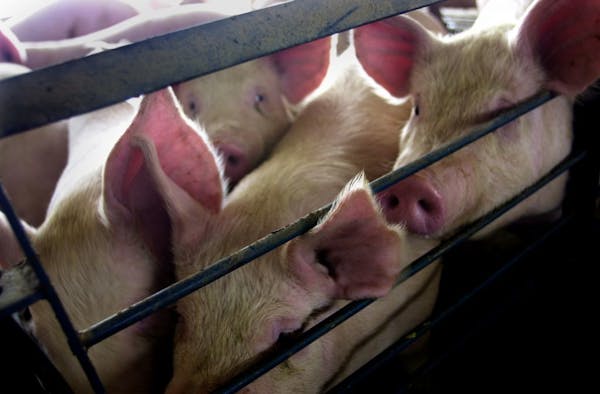Counterpoint
Reading the Star Tribune last weekend ("Farm practices face a critical test in U.S.," editorial, Dec. 22; "Paying a price for fertilizer at faucet," article, Dec. 23), I realized that these writers really don't get it. Why is it the farmer's fault? Public policy, passed by politicians, determines how farmers are raising your food today.
Public policy is subsidizing corn, soybeans and wheat to a level where most farmers cannot afford to plant anything else. Public policy developed the ethanol industry at the expense of the livestock industry.
I am the fourth generation to work my family farm. I am also a veterinarian who was trained to help livestock producers. I have also worked on state and federal legislation to develop better farm policy.
I read article after article about those bad farmers who raise livestock in small pens. When I started practicing veterinary medicine in Carver County in 1973, livestock was raised in the environment you now describe as desirable. Public policy told those farmers they were doing it wrong.
I remember being told by a dairy expert at the Minnesota Department of Agriculture that if you are not milking 500 cows in five years, you will be toast. My 50-cow dairy farmer clients said they did not want to milk 500 cows, so they decided their only option was to quit.
For many years, corn was priced at less than the cost of production. Corporate farms took advantage of that and purchased corn rather than growing it. This put them at an advantage to the farmer who raised his feed. The subsidies we hear about farmers getting were actually subsidizing the corporate farms that are now said to be bad.
I read much about crop insurance. This is subsidized to a level where it is more profitable for farmers in Indiana to have a crop failure than a good crop. It also forces bankers to finance only farmers who can get high levels of crop insurance, so they will be assured of being repaid.
I also read about horses starving for lack of hay. Alfalfa and grass producers do not have a crop-insurance program that interests bankers. They do not have any support from farm programs. They do not get direct farm payments or low-interest marketing loans.
The shortage of hay has more to do with public policy than with any drought. Yet alfalfa and grass producers create less soil erosion, use less herbicide, less commercial fertilizer, less energy and no government payments. Their product is healthier for horses, ruminants and the environment. But there is no farmer more discriminated against than the alfalfa and grass producers.
I contributed to the 1995 farm bill. Its main intent was to give farmers a seven-year severance payment and then have the government stop any form of subsidies. But our policymakers could not stand being unable to micromanage farmers, so they reintroduced the significant subsidies we suffer with today.
It is my opinion, from my kitchen table, that editorials and articles like the ones I am reading will increase the real possibility that today's public farm policy will soon lead to a day when we will see people in this country starve. I have said often that if our country would let farmers be farmers, you will eat, but if you let politicians run our farms, you will soon starve.
Do you really think U.S. Sen. Amy Klobuchar or U.S. Rep. Michele Bachmann knows how to farm our land better than today's farmers do?
Calling farmers names (as some online commenters have done) or telling them they are doing it wrong will just speed up the process of what is coming. It's my opinion, from this same kitchen table, that the best thing our politicians could do to avert this "food cliff" is to pass a "No Farm Bill."
Farmers are not bad people; they just feed you. If you like to eat, I would be kind to them and quit calling them names.
________________
Harlan Anderson is a veterinarian and farmer in Cokato, Minn.

The little park that could … be better
Climate change looms large this election year
For this Minnesota legislator, action targeting child abuse is intensely personal


